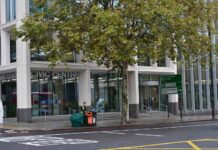
Lambeth council’s planning committee tonight (27 July) unanimously rejected an application to build a large metal recycling plant in West Norwood.
It did so on the grounds that the increased traffic in Windsor Grove, the narrow cul de sac leading to the proposed site, would impact its residential character.
The committee had been warned by the applicant that it would appeal against a rejection, claiming substantial costs from the council should it succeed.
A top planning barrister was standing by to give advice if required, but councillors declined to consult him.
This was the second hearing in a fortnight on the application by a property developer linked to Southwark Metals – which would operate the site. The first ran out of time before a decision could be made.
Today’s session brought the time the committee spent listening to highly technical discussion of traffic, noise and pollution to almost five hours.
The committee also heard strong arguments from opponents of the scheme and the consultants retained by the applicant to support it.
Local MP Helen Hayes, local councillors and local residents denounced the plan.
One strong opponent was local Gipsy Hill councillor Matthew Bennett, Lambeth council’s cabinet member for planning.
The council’s own paid officers, together with their technical consultants and those of the applicant, all insisted that the plans, which would see a 164-fold increase in metal processed at the site, would have “negligible” effects on noise, air quality and traffic.

These three issues were the top concerns of local residents, who again protested outside the town hall, and of campaigners who stress the whole of the borough would be affected by the plans and the traffic they would generate.
Robert O’Sullivan, the council’s head of development management, warned the councillors who made up the committee that their concerns and those of their constituents would not count as valid legal reasons for refusing the application and would be overruled by a government inspector at an appeal.
Consultant Sean Tickle, director of Rolfe Judd Planning, had summed up the experts’ dire warnings by saying that the unpopularity of a planning application was not grounds for refusing it.
Another consultant warned that rejection would lead to an enquiry where costs would be awarded against the council and that its officers would be “placed in an impossible position” – having to defend a decision that they had opposed.
In the end, Helen Hayes’ simple statement: “It’s simply the wrong site”, formed a basis for rejection.
Robert O’Sullivan explained to councillors that a rejection on the grounds “amenity” was the least likely to be overturned by an appeal.
The site and its expected 160 traffic movements a day, 56 of them by HGVs, would alter the character of what is a partially residential area containing two schools.
Councillors voted unanimously to back a resolution to reject the scheme because of its effect on the character of Windsor Grove.
The exact wording of the rejection will be worked out between O’Sullivan and committee chair Joanne Simpson.
Councillors also voted to delegate to officers the handling of any possible appeal against their decision.
A full recording of the two-hour meeting should be available on Lambeth council’s website tomorrow.






